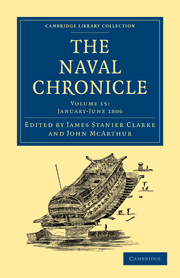 The Naval Chronicle
The Naval Chronicle Book contents
- Frontmatter
- PLATES IN VOLUME XV. From Original Designs
- PREFACE TO THE FIFTEENTH VOLUME
- BIOGRAPHICAL MEMOIR OF WILLIAM DOMETT, ESQ. REAR-ADMIRAL OF THE WHITE SQUADRON
- BIOGRAPHICAL MEMOIR OF THE HONOURABLE HENRY EDWYN STANHOPE, VICE-ADMIRAL OF THE BLUE SQUADRON
- BIOGRAPHICAL MEMOIR OF CAPTAIN SIR EDWARD BERRY, KNT
- BIOGRAPHICAL MEMOIR OF THE LATE CAPTAIN GEORGE DUFF, WHO FELL IN THE ACTION OFF TRAFALGAR
- BIOGRAPHICAL MEMOIR OF CUTHBERT LORD COLLINGWOOD, VICE-ADMIRAL OF THE RED, And Commander in Chief of the Mediterranean Fleet
- BIOGRAPHICAL MEMOIR OF THE RIGHT HON. WILLIAM EARL OF NORTHESK, K.B. REAR-ADMIRAL OF THE RED SQUADRON, And one of the three Flag Officers who commanded the British Fleet in the ever-memorable Battle of Trafalgar
- INDEX
BIOGRAPHICAL MEMOIR OF CAPTAIN SIR EDWARD BERRY, KNT
Published online by Cambridge University Press: 10 January 2011
- Frontmatter
- PLATES IN VOLUME XV. From Original Designs
- PREFACE TO THE FIFTEENTH VOLUME
- BIOGRAPHICAL MEMOIR OF WILLIAM DOMETT, ESQ. REAR-ADMIRAL OF THE WHITE SQUADRON
- BIOGRAPHICAL MEMOIR OF THE HONOURABLE HENRY EDWYN STANHOPE, VICE-ADMIRAL OF THE BLUE SQUADRON
- BIOGRAPHICAL MEMOIR OF CAPTAIN SIR EDWARD BERRY, KNT
- BIOGRAPHICAL MEMOIR OF THE LATE CAPTAIN GEORGE DUFF, WHO FELL IN THE ACTION OFF TRAFALGAR
- BIOGRAPHICAL MEMOIR OF CUTHBERT LORD COLLINGWOOD, VICE-ADMIRAL OF THE RED, And Commander in Chief of the Mediterranean Fleet
- BIOGRAPHICAL MEMOIR OF THE RIGHT HON. WILLIAM EARL OF NORTHESK, K.B. REAR-ADMIRAL OF THE RED SQUADRON, And one of the three Flag Officers who commanded the British Fleet in the ever-memorable Battle of Trafalgar
- INDEX
Summary
“A thousand Chiefs His Gallant Course Pursue.”
Carey.The circumstance of Sir Edward Berry having participated in the perils and glory of three of the engagements in which the immortal Nelson was concerned, affords a sufficient motive for introducing him to the notice of our readers.
This gallant officer was born in the year 1766. His education was liberal; but fortune had not blessed his birth with independence, and he was left to search for that competence which, when honourably acquired, confers consequence and obtains respect. His father was a respectable member of the mercantile community in London; but dying before he had realized an adequate provision for his family, a young widow, and seven children, were left with but very slender means of support. But, though suddenly bereaved of a parent, and deprived of the flattering prospects of wealth, the offspring of Mr. Berry were not destitute of friends. Titus, his younger son, was bred to the profession of a Surgeon, and is now in extensive practice. Of five daughters, one died young, two are married, and two, we believe, still remain single.
Edward, the subject of the present memoir, evinced an early predilection for the naval service; and, favoured by circumstances, he was, when very young, initiated in that profession, to which his talents and his courage have done so much credit. The Rev. Mr. Titus Berry, his uncle, had been the master of an academy at Norwich, where the late Lord Mulgrave received part of his education.
- Type
- Chapter
- Information
- The Naval ChronicleContaining a General and Biographical History of the Royal Navy of the United Kingdom with a Variety of Original Papers on Nautical Subjects, pp. 177 - 264Publisher: Cambridge University PressPrint publication year: 2010First published in: 1806


